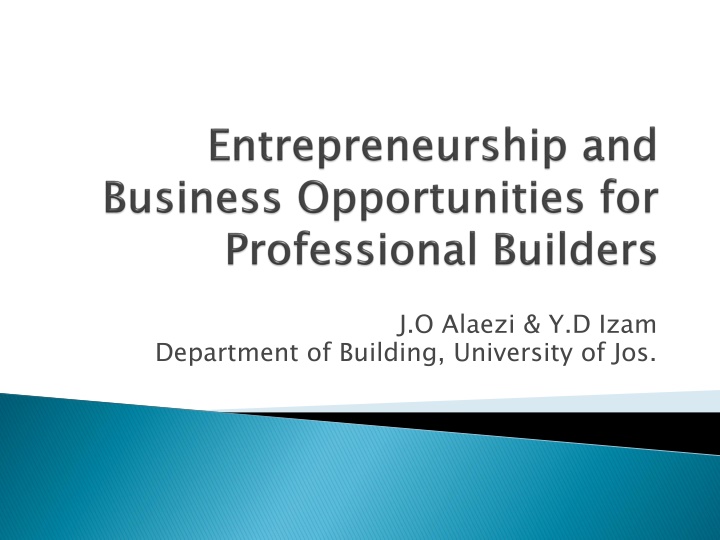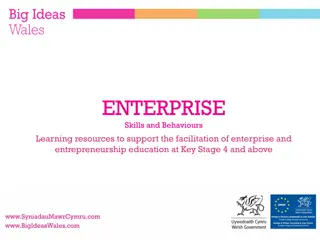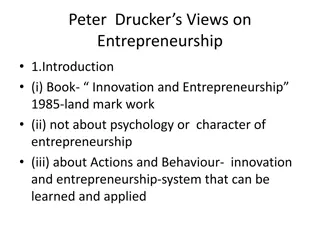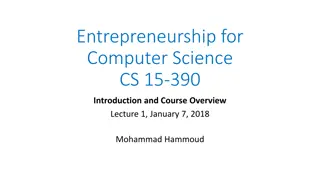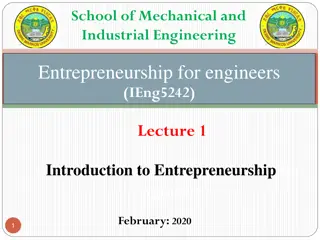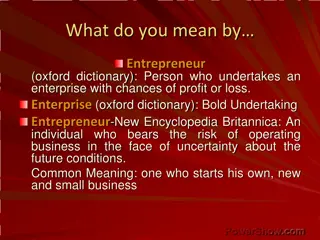Unlocking Entrepreneurship Potential in Nigeria: A Guide for Builders
Entrepreneurship holds great potential for creating jobs, reducing unemployment, and empowering youth in Nigeria. However, many young builders lack knowledge in entrepreneurship. This guide explores key concepts of entrepreneurship development, identifies opportunities, and offers strategies for building a successful venture. It emphasizes the importance of mentorship, feasibility studies, business planning, and financial discipline to realize entrepreneurial ambitions and contribute to national economic growth.
Download Presentation

Please find below an Image/Link to download the presentation.
The content on the website is provided AS IS for your information and personal use only. It may not be sold, licensed, or shared on other websites without obtaining consent from the author.If you encounter any issues during the download, it is possible that the publisher has removed the file from their server.
You are allowed to download the files provided on this website for personal or commercial use, subject to the condition that they are used lawfully. All files are the property of their respective owners.
The content on the website is provided AS IS for your information and personal use only. It may not be sold, licensed, or shared on other websites without obtaining consent from the author.
E N D
Presentation Transcript
J.O Alaezi & Y.D Izam Department of Building, University of Jos.
Entrepreneurship remains the viable option to create jobs, reduce unemployment, poverty and youth empowerment. Most young builders do not have a good knowledge of entrepreneurship and what it really entails. Pursue their dreams and contribute to overall productive capacity and national economic growth and development.
Absence of entrepreneur skill development among builders. Relative ignorance of enormous business opportunities in Nigeria. Ignorance and apathy as regards the gains of entrepreneurship in Nigeria.
Review of key concepts of entrepreneurship development in Nigeria. Identification of entrepreneurship opportunities for professional builders Evaluate the knowledge base and preferences of builders about entrepreneurship and business opportunities within the Nigerian economy Identify major reasons for choice of business opportunities.
Entrepreneurship is the process of using initiative to transform business concept to new venture, diversify existing venture or enterprise to high growing venture potentials. Entrepreneurship is the ability to seek investment opportunities and establish an enterprise based on identified opportunities. An entrepreneur is a person who chooses or assumes risk, identifies business opportunity, gathers resources, initiates actions and establishes an enterprise to meet demand or market opportunity.
Early entrepreneurship started with trade by barter even before the advent of any form of exchange of money. Nigeria has deep entrepreneurship culture as can be seen from early history of the peoples of Hausa, Ibo, Yoruba, Benin in the 13thand 19thCentury. Dying, weaving, metal working, agricultural products, weaving, woodcarving were some of the trades our fore fathers were involved in.
Evaluation of chosen business feasibility and viability analysis. Conduct a Feasibility study Company registration with CAC Business Plan Engagement of right business partners Financial Discipline and Accounting Standards Marketing and sales strategy Proper packaging/presentation Set realistic and achievable goals. Identify a mentor to guide all your business decisions.
Course Code BUD 101/1012 Level of Study 100 Level Course Title Introduction Building I/II Introduction Entrepreneurship skills Principles Accounting Builders Statistics Builders Quantities and Cost Planning Builders Estimating and Price Analysis Builders Entrepreneurship Studies Construction Economics Business Organisations Accounts Students Work Experience Scheme (SIWES) Professional Practice & Ethics Credit Unit 2 to GST 223 200 Level to 2 BUD 231 200 Level of for 2 BUD 302 300 Level for 2 BUD 371 300 Level 2 for BUD 372 300 Level 2 for BUD 346 300Level 2 BUD 452 400 Level 2 BUD 464 400 Level 2 and BUD 491 400 Level Industrial 15 BUD 531 500 Level 2 Total 35 Credit Units
To become a registered builder, you must have graduated from a polytechnic or university. Register with the Nigerian Institute of building as an associate or graduate member. Write and pass the necessary examinations with NIOB before proceeding to CORBON for registration. From the table shown above 35 units (about 20%) of the 180 units of courses required to graduate from a university have entrepreneurship focus.
Structured Questionnaire using 5- step scale of preference. Personal interviews Population of study (55 Builders in FCT, Abuja)
S/N BUSINESS OPPORTUNITY KNOWLEDGE BASE Sum 16 2 26 10 14 INTEREST Rank 5 16 1 9 7 Sum 15 2 25 10 12 Rank 5 16 1 9 7 1 2 3 4 5 Scaffolding Journalism Building Maintenance Equipment/Plant Leasing Building Component Manufacturing Specialist Contracting Publishing Event Structures Waste Management Health & Safety Specialist Glazing Consultancy Quality Control & Quality Assurance Real Estate Development Interior Decoration/Fitting Human Development(Training Artisans & Craftmen) Energy Studies with respect to Buildings Deconstruction Works Buildability/Maintenability Analysis Green Development Vocational Carpentry Building Management Materials & 6 7 8 18 3 6 4 15 13 17 3 5 4 15 13 Management 9 10 11 12 13 9 6 8 19 7 10 13 11 3 11 9 5 7 18 7 10 13 11 3 11 14 15 16 22 15 7 2 6 12 22 14 7 2 6 12 Capital of 17 3 15 2 15 18 19 1 13 17 8 1 12 17 8 20 Building 7 13 6 13 21 Training in 4 14 4 14 22 Information 4 14 4 14
Persistence, resilience, focus, determination and hard work are keys to becoming a successful entrepreneur. Findings reveal that most builders are not knowledgeable about great business opportunities available to them and are interested in entrepreneurship because of profit, followed by competence, then passion and interest. The study recommended the setting up of right business environment by Government
The Nigerian Institute of Building and Council of Registered Builders of Nigeria to organize regular workshops and training on entrepreneurship opportunities available in Nigeria. Mentoring by senior and experienced builders Networking and relevant skills in ICT.
